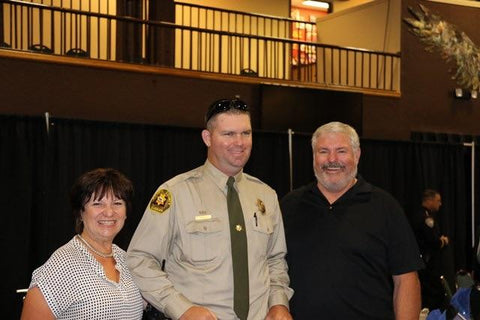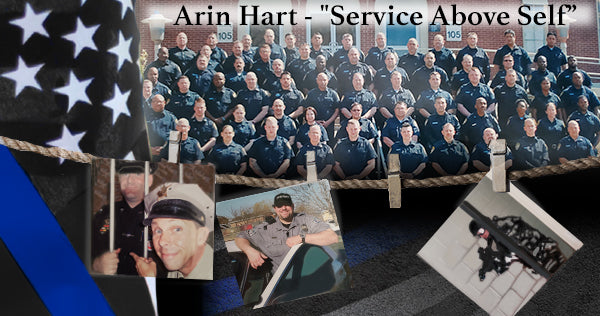Surviving PTSD | Jason Thatcher
I heard about Jason Thatcher and his non-profit organization called Blue Line Outdoors from a mutual acquaintance who spoke very highly about his therapeutic fishing trips. Jason uses these trips to help fellow police officers who are suffering from Post Traumatic Stress Disorder (PTSD), to get away and relax from everyday stressors. At the time, I just finished working on another story where I wrote about the effects of PTSD and I wanted to continue this dialog. PTSD is a serious, disabling condition, and due to work complexities within law enforcement, many police officers are affected by it. Many of them might recognize the classic symptoms that are related to PTSD such as, inability to sleep, nightmares, or even feeling numb but far too often don’t seek help. This is Jason’s story.
When I spoke with Jason, he freely shared his story with me and his own personal struggles with PTSD. I was moved by what he had to say and felt like I was getting a real glimpse into the life of a police officer. Jason knows all too well that cops are often reluctant to seek help, fearing it will jeopardize their jobs. Drawing from his own experiences, he knew first hand how disabling PTSD can be and how it can impact every aspect of your life when not treated immediately. At first, Jason didn’t want to face that something was wrong, his condition used to be his secret but not any longer, helping officers who are suffering from trauma was the motivation to start his organization. Along with his love for fishing, which is the driving force, pushed him to help his colleagues through therapeutic fishing trips. These trips are designed to allow officers to decompress from the trauma in their lives.

From 2002 to 2008, Jason worked as a fishing guide in Alaska and in California. He realized he had a deep passion for being on the water and taking people out on the boats. Jason will tell you he doesn’t like being stuck inside and prefers being outdoors. During this time, he was also working construction to supplement his income, but it wasn’t in his plans to do that long term. His heart kept leading him back to the idea of being on the water and fishing. He really wanted to take his love for fishing to the next level and start his own business. He certainly liked the idea of being his own boss as a fishing guide but obstacles kept getting in the way. While working in the guiding business he chose salmon fishing because it was the most profitable way to earn money. When the California salmon population collapsed and many of the fisheries were shut down, he was convinced he had seen the last of salmon in California. He was saving money from working in Alaska as a fly fisherman and from his guiding trips in the fall. But he wasn’t working as a full-time fishing guide when the economy collapsed - along with the salmon runs. Financially, he began to struggle. His career goals changed and he decided to take what money he saved and put himself through the police academy. He continued to find outside work to supplement his income, but fishing remained his passion and a positive outlet in his life.

Learning never stops in law enforcement and because you have to work in a diverse and dynamic environment, you have to learn new tactics and techniques throughout your career. Besides the mandatory retraining that most departments commission on officers, training opportunities exist for an almost immeasurable number of topics that helped Jason excel during his career. Topics included advanced defensive tactics, physical fitness and beyond. Virtually any training that you can think of aided his career and was often made available at no cost. Police work was hard and training was even harder. Jason learned during training to protect himself and others, and safely control arrestees through rigorous defensive tactics training. Even though it was hard work for him, it was a lot of fun, and many of the activities brought on an adrenaline rush that kept him excited and enthusiastic about the job. He received excellent tactical and firearms training, pursuit driving, first aid and CPR, and all kinds of advanced training in a number of specialty areas.
He graduated from the academy in 2009 and began his career in law enforcement working as a Deputy Sheriff for a Northern California law enforcement agency and the Humboldt County Sheriff’s Department. He was hired by the Shasta County Sheriff’s Office in 2012 as a lateral Deputy and assigned to Patrol. He really enjoyed working patrol much better than working in the office. While working countywide as a Patrol Deputy, he was investigating suspicious activity, patrolling roads, controlling collision scenes, and helping the victims from accidents. On May 18, 2019, Jason received the Exchange Club of Redding Officer of the Year Award at the 43rd annual Peace Officer of the Year Award event. Officers of the year are nominated by their peers and supervisors.

A lot is to be said about the brotherhood of the Thin Blue Line, and how officers band together. For Jason, the brotherhood hit him after graduation. Working on a team offered him a sense of belonging and allowed him to become a part of a family. He didn't find this with his other jobs. When the chips were down, the team banded together to help a fellow officer which made him feel very close to his working partners. Working 12-hour shifts with other deputies and going through the events of the day together was the ultimate team experience. His coworkers were what mattered more than anything. He would have done anything for them. The most satisfaction he got from the job was during his 4 years as a field training officer. Seeing new deputies blossom into good cops and great partners was incredibly rewarding for him. Another rewarding experience for Jason while working in law enforcement was finding opportunities to truly have a positive influence on people’s lives. This didn’t happen every day, but when it did, it was rewarding. He really enjoyed stopping and chatting with kids. He would let them check out his patrol car and play with the lights and siren. Chases were an adrenaline rush and were addictive for him.

Most people are not aware of all the dangers facing law enforcement officers. Working as a Patrol Deputy can be full of potential dangers. Traffic fatalities have consistently been the single leading cause of death for police officers for the past several years. They spend a lot of time driving, increasing their risk of being in an accident. Many times they are outside their vehicles on busy streets at a scene of traffic crashes or traffic stops. This puts them in vulnerable positions of getting hit by a driver passing by. The stress that comes from working in a dangerous job and the long and irregular hours has the potential for post-traumatic stress. Being involved in frightening and dangerous incidents, horrific scenes of death, and destruction, and unpleasant encounters with angry citizens can cause depression and suicide for anyone. This really shows how demanding this job can be on our law enforcement officers.
Jason began to feel the constant stressors of the job which lead to a greater feeling of social isolation. In 2013, Jason and another deputy were involved in an officer-involved shooting. After the incident, he began feeling he was under a perpetual microscope. This lead to shutting down his emotions. After the series of events unfolded, he began to self destruct. Bombarded with so many negative situations, he felt like the job was going to kill him. He started abusing alcohol. Dependency became a way of life due to repetitive exposure to trauma, and socializing with his coworkers - who were also drinking too much - wasn’t helping his situation. He felt he couldn’t go to them for the support he needed since they were trying to cope with the same issues. He wasn’t sleeping and he was constantly haunted by death and reliving nightmarish situations in his mind. His dreams involved being assaulted and weapons not working, one of his dreams involved his gun trigger turning to mush and the bullets being ineffective. There were angry ghosts of victims and descendants haunting his mind, and visions of his partners being violently killed right in front of him. This became his normal. Often he would avoid sleeping because it was too disturbing to be alone with his thoughts.
It became very apparent to his closest friends and family that his life had turned for the worse. The negative changes forced the department and peer support to get involved. Jason received different treatment over the course of a year which included medications and therapy. It was determined he was suffering from Cumulative Post Traumatic Stress Disorder among other things. The symptoms he was experiencing included re-living the event, avoidance, nightmares, severe isolation, and hyperarousal or hypervigilance including difficulty sleeping and trouble concentrating. He found himself feeling super tense, making it difficult to be around people. He had a constant sense that something bad was going to happen and he couldn’t let it go. Eventually, he simply didn't care anymore and welcomed dangerous situations and physical confrontations with open arms. He was taking unnecessary risks far too often. A strong sense of irritation grew even stronger, leaving him depressed and physically ill. He lost interest in hobbies and his relationships with everyone was suffering. In 2019, Jason left the Shasta County Sheriff’s Office on a medical retirement shortly after being diagnosed with PTSD. After leaving law enforcement, he felt the change would be good for him since he was having such a difficult time doing the job and managing his life. He felt that things at work became very political and not an environment where he could cope with the challenges he was facing.
Friends from the outdoor industry reached out to Jason and invited him to join them on several fishing trips. He appreciated their support and how they were going out of their way to help him. The support from friends put him on a good path and opened his mind to receiving help through fishing. This was the birth of a new idea for an outreach program that would offer support and help to officers that experienced trauma as he did. Jason believes helping others has played a big part in his healing process. Being away from the stress and negativity, he started feeling better and he noticed a significant change in his attitude. Becoming a whole person was a long and frustrating journey for Jason, and allowing people in his world helped him realize everything was going to be okay.

Over a year ago, Jason and his wife started fishing trips with a mission called Blue Line Outdoors. They offer a unique kind of peer support by helping other officers who have suffered from trauma. They host outdoor trips such as guided fishing or waterfowl hunting completely free of cost. On the trips, Jason encourages the officers to bring a support partner to help them relax. A typical fishing trip takes place on one of three rivers in California. 90% of the fishing trips are done on the Sacramento River, and the other 10% is done on the Feather and Trinity Rivers. Most of the officers enjoy participating in fly fishing for wild trout. This type of fishing is done from a drift boat, which is similar to a custom rowboat made for navigating rivers.
The trips start at 8:00 in the morning and lasts until 4:30 in the evening. This allows them to cover 8 to 16 miles of very scenic rivers. Drift boat fishing is a great opportunity for them to learn fly fishing with personal instruction since the boat only accommodates two people. Another form of fishing that’s offered is jet boat fishing for salmon and striped bass. This allows up to 6 people on the powerboat. He and his wife sponsor the trips and take care of all the operating costs. The officers pay for their own lodging and flights when needed. Jason and his wife have been very successful in obtaining donation gifts from the community to help cover some of the operating costs. Most of the officers that come to fish are from the local surrounding areas.

Jason gives a lot of credit to his wife who has been very supportive throughout this entire process. A lot of good changes have happened to Jason but the greatest, most rewarding change has been the new addition to his family. 11 months ago, their sweet daughter, was born. Jason has gained a better sense of purpose after getting married and having a baby, Jason will tell you he is not making money from the tours but he is making friends. If you can benefit from this program you can reach out to Jason by sending a message here on his Blue Line Outdoors Facebook page.

Leave a comment
Comments will be approved before showing up.





Linda Searles
Author